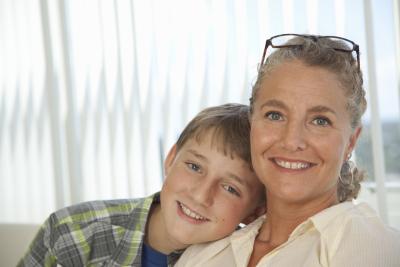Adopted children have challenges becoming part of a new family when they separate from their biological family, according to Michael F. McGinn, author of “Developmental Challenges for Adoptees Across the Life Cycle.” Attachment is the goal, meaning the adopted child and the adopting parents achieve a mutually affectionate connection.
Not First Choice
Except for the cases of single, gay or lesbian people, adoptions are typically not the first choice in parenting. Therefore, the adoption process is often a bittersweet one, filled with celebration, but also with mourning, says McGinn. Adopting because of infertility comes after a lengthy and often traumatic experience. Children who lost their parents because of death or children who were removed from the home because of neglect or abuse are going to have emotional scars.
Feelings of Loss
Even in the best of circumstances, attachment problems can be difficult to avoid. Babies begin attaching to the biological mother in the uterus. Therefore, it is more difficult to form attachments with non-biological parents. The adopted child, at some point, will feel the loss of her birth parents. The adoptive parents, in the case of infertility, feel a loss of continuing their genes. This foundation of loss contributes to challenging psychodynamics, says McGinn. Adoptees can feel separation anxiety in the form of not being able to trust, being worried about rejection and can have identity issues.
Normal Feelings
Adoptees who are older children feel an overt and acute loss of their family. Adoptees who are infants develop feelings of loss later in life when they are able to understand what adoption means. No matter the age of the child you adopt, it is normal for the child to experience separation issues.
Trust Issues
Adoptive children have trust issues, whether they had to be removed from the home or whether the birth mother had to give them up as an infant. The infant bonded during the nine months, and it will be more difficult for that infant to trust the adoptive parents, says McGinn. Adoptive parents who keep secrets from adoptive children make matters regarding trust worse.
About Attachment
Attachment levels fall on a continuum. Typically, children who were adopted as infants into a permanent home may have attachment issues, but they will usually not be as extreme as a child who has dealt with poor parental care. If that child experiences multiple placements, he may never trust or form an attachment to any caregiver, no matter how caring or competent the caregiver is, says McGinn. With children like that, the key is to take things slowly, according to Adoption.com. At some point, your adoptive child may be more receptive to your love. To form attachments, babies and children must experience consistent caretaking and feel safe in the world.
Healthy Relationship
Birth parents have an initial advantage in developing a bond and attachment with their children. But, adoptive parents can also be successful in forming attachments with their children. The most important ingredient in forming a healthy attachment is the nature of the relationship, says McGinn.





